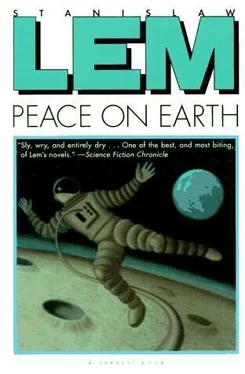Such restraint, perhaps, came not from insufficient power but from a strategy. So far nothing on the moon had really attacked the reconnoiterers, whether robots or people. They had destroyed themselves, being the first to shoot. As if the nonliving inhabitants of the moon had decided to remain on the defensive. And true, an adversary on the attack is in less clear a position than the adversary who knows an attack is coming. And so the doctrine of ignorance as a guarantee of peace, devised with so much trouble, had been turned with mockery and menace against its inventors.
Wivitch was speaking: the third group of micropes had arrived safely and I was on their screens again. So maybe they had only wanted to blind Control during the nude-woman mirage. I was plunged into thought. The moon, listening to the radio, had to know about the growing anxiety on Earth. The fear stirred by the press had infected not only the people but the governments. Though everyone realized that a nuclear strike against the moon would spell the end of peace on Earth. Therefore either a preemptive attack against the human race was imminent, or something very strange was taking place on the moon. Wivitch called me again to tell me that all the micropes would be deployed. They would come in successive clouds, wave after wave, not only from my ship but from all four corners of the world, as it were, because it had been decided to activate the reserves stockpiled under the zone of silence. I hadn’t even known they were there. I sat down in that lifeless desert and leaned back a little to take in the black sky. I couldn’t see the ship but saw the micropes, sparkling clouds descending and also approaching from all horizons. Some hung over me, swelling and billowing and glittering like a swarm of golden gnats playing in the sun. Others, the reinforcements, I could make out only now and then, when one of the stars winked out for a moment, obscured by a cloud of my microscopic guardians. They had me in their screens now at all angles. I should have got up and continued on but I was suddenly reluctant. Slow and ungainly in my heavy spacesuit, quite the opposite of the micropes, I made a good target even for someone with bad cataracts. Why did I have to be at the front of this mission anyway? Why couldn’t the swift micropes go instead, scouting ahead for me? Control agreed. A change of tactics. Swarms of golden mosquitoes sailed above me in a wide swath toward the lunar Urals.
I walked, looking carefully in all directions, until I came to a gently rolling plain pitted with small craters filled with sand. In the sand of one crater was something that looked like a thick dead branch. I grabbed it and tugged, as if pulling a deep root from the ground. Then I used a small folding shovel that I carried strapped to my side. From the sand and dust emerged a piece of iron, burnt, perhaps a fragment of one of the countless primitive rockets that crashed here in the early days of lunar exploration. I didn’t call Control, who through the micropes could see my discovery for themselves. I pulled at the strangely bent bars until a thicker part appeared, and under that was a shinier metal. It didn’t look particularly promising, but having begun this scavenging, I pulled harder, not afraid that one of the sharp pieces might puncture my suit, because I had no need of air. But something changed. At first I didn’t understand why it was hard for me to keep my balance, then realized that my left boot was caught, gripped by flattened, curved prongs. I tried to free it, thinking I’d walked right into this one, but the foot was held fast and even the blade of my shovel didn’t help, unable to pry the prongs apart.
“Is Wivitch there?” I asked, and waited three seconds for him to respond.
“They have me in some kind of bear trap,” I said.
How incredibly stupid, getting taken by something like this! I couldn’t get loose. The micropes surrounded me like excited flies as I struggled with the clamps that had closed on my boot like a vise.
“Return to the ship,” Wivitch suggested. Or it might have been one of his assistants, because the voice sounded different.
“I don’t want to lose the remote,” I said. “I need to cut this!”
“You have a Carborundum saw.”
I unhooked the flat holster at my thigh, and in fact it contained a nice little saw. I plugged its cord into the generator in my suit and bent over. Sparks flew from the spinning edge. The pincers holding my boot at the ankle began to give, practically cut all the way through, when I felt a growing heat in the boot. With all my strength I wrenched my leg away, then saw that the metal bulb from which the bars protruded like roots from a great potato was glowing red-hot. The white plastic of the boot had blackened and was cracking from the heat. I made one last effort and, suddenly released, fell backward. Blinded by forked lightning, I felt a violent blow in my chest, heard the sound of the suit torn open, and was plunged into impenetrable darkness. I didn’t lose consciousness, I was simply in darkness. After a moment I heard Wivitch:
“Tichy, you’re on the ship. Say something! The first remote was taken out.”
I blinked. I was sitting in the chair, my head on the headrest, my legs curiously bent, and holding my chest where a moment ago I had taken the blow. A painful blow, I realized only now.
“Was it a mine… ?” I asked. “A mine connected to a bear trap? Was that the best they could think up?”
I heard voices, but they weren’t talking to me. Someone asked about the micropes.
“There’s no video,” said someone else.
“What? They were all destroyed by that one explosion?”
“Impossible.”
“Impossible or not, we have no video.”
I was still breathing as if after a long run, regarding the face of the moon. With the tip of my finger I could cover the entire crater of Flamsteed and the plain on which I had so stupidly lost the remote.
“What’s wrong with the micropes?” I asked at last.
“We don’t know.”
I looked at my watch and was surprised: I had spent almost four hours on the moon. It was after midnight, by ship time.
“I don’t know about you,” I said with a yawn, “but I’ve had enough for today. I’m going to sleep.”
I awoke rested and immediately went over the events of the day before. You always think better after a good shower, which is why I had insisted on a bathroom with running water instead of those wet towels which are no substitute for a tub. Of course there couldn’t be a tub, with the wash area no bigger than a barrel. Water rushed in on one side and was sucked out by a strong current of air on the other. In order not to drown, because water in zero gravity covers the body and face in a growing layer, I had to put on an oxygen mask before showering, which was a nuisance but better that than no shower. As we all know, even after the engineers could build rockets in their sleep, astronauts were still plagued by toilet accidents, and technology wrestled with that problem for a long time. Human anatomy is horribly unsuited for outer space. The astroengineers lost sleep over this but not the science fiction writers, who being artists simply didn’t mention it. Urinating (for men, that is) wasn’t too bad, but defecating was solved only with the offices of a special computer, which was fine, but when that broke down you found yourself in extremity and had to improvise. In my lunar module, this computer — about the only one — worked throughout like a Swiss timepiece, thank God. Washed and refreshed, I drank my coffee from a plastic bulb and ate a raisin cake under a funnel with its suction set on high so the crumbs wouldn’t stick to my fingers or choke me. I don’t like to give up my habits. Having breakfasted properly, I took a seat at the selenograph and, gazing at the globe of the simulated moon, smiled, since they wouldn’t be inflicting advice on me for a while. I hadn’t informed Control that I was awake; they thought I was still sleeping.
Читать дальше












